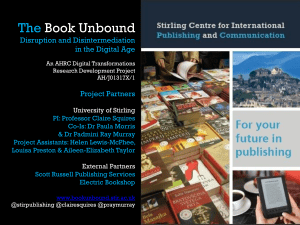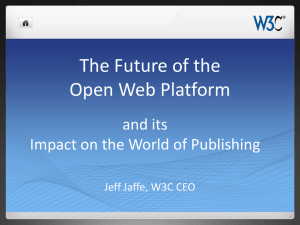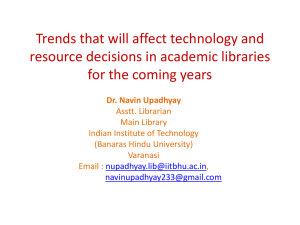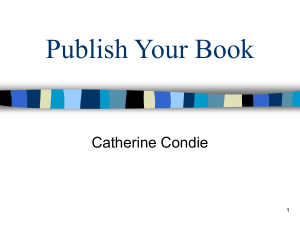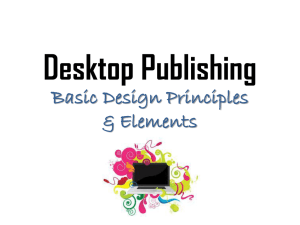O`Reilly Tools of Change for Publishing
advertisement
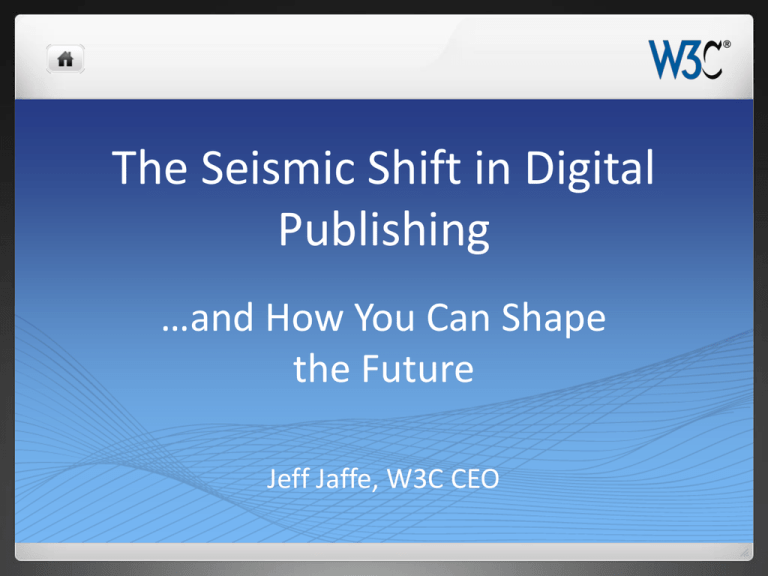
The Seismic Shift in Digital Publishing …and How You Can Shape the Future Jeff Jaffe, W3C CEO 20 Years Ago The Web Changed Publishing Early Impact Global distribution of linked documents Low barrier to entry for sites Non-linear reading habits Creation of bite-sized content No Substitute for Print Low-resolution screens Impoverished layout, style Static, read-only Low bandwidth Observation: The early Web was useful for publishing, but its relevance to the industry was not sufficient for publishers to participate in core standards development. Image: outer-court.com Good Enough for Innovation Businesses flocked to the Web to push content Revenue models appeared (e.g., pop-up ads, search engine ads) Tools lowered cost of publishing by more people (blogs, wikis) So the Web Grew Recent Tectonic Shifts Have Accelerated Movement Geography no longer a barrier Internet everywhere Social Cloud Broadband Generational divide in consuming info Mobility Image: room6halcombeschool.blogspot.com Significant Impact on Publishing Pew: Survey Finds Rising Reliance on Libraries as a Gateway to the Web Web Trends Will Further Alter Landscape Web will improve Screens, typography, and layout will grow in power Web will add value Links will raise asset value exponentially Rich media will enhance ebooks, news, education Data will power journalism; curation Web will spur business model innovation Many eBooks will become (mobile) apps, including ads Photo: Andy Goldsworthy Consumer Behavior Paradigm Shifts Rich content anywhere, anytime, across multiple devices Social, customized Pew: “[Mobile phone] users under age 50 are almost three times as likely as their older counterparts to get news on the go…” Forbes: “Google Research: No Mobile Site = Lost Customers” Human activities (work, play, family) overlap Pew: “News is becoming a shared social experience as people exchange links and recommendations as a form of cultural currency in their social networks.” Nielsen: “33% of people 18-24 use social media in the bathroom” Time-slicing William Schrader in Pew survey: “The youth of 2020 will enjoy cognitive ability far beyond our estimates today … [but also] by their ability to share immediately any information with colleagues/friends and/or family, selectively and rapidly.” This is Happening Across Industries TV/Entertainment Industry Stories Rich content anywhere, anytime, across multiple devices Social, customized “This year, we’re looking forward to turning iPlayer into an entertainment destination…for the BBC’s iPlayer, 25% of access is mobile (BBC) “Zynga signed a deal with Synacor … [the] move puts Zynga games seamlessly on all screens for more stickiness potential.” (Ecommerce Times) YouTube, Hulu, Google TV, Vimeo, … “[Smart] TV platforms offer global distribution opportunities, … high-end, attractive niche content, which cannot easily find distribution via traditional broadcasting.” (TelecomsTech) Time-slicing Study: “Majority of US consumers watch TV and surf Web simultaneously” But Publishing Unlike Other Industries… Automotive, government, health care, etc. serve their own intrinsic purposes Web has an impact on delivery of those services, but is secondary Web is more “intimately” tied to the intrinsic purpose of publishing …and thus a Bigger Stake in the Future Parts of the industry have leveraged the Web for 20 years and are early adopters. Others are just beginning the journey eBooks are picking up the technology today Tomorrow they will be fully part of the Web Although the industry as a whole is not there yet, in time… Publishing = Web Photo: Electro-L Images Building on the Open Web Platform • Web pages are more beautiful, interactive and intelligent • HTML5 provides cross-browser interoperability and all major browser vendors plan to support it; now complete and stable • Video is a first-class citizen • Simplifies data integration • Runs on many devices • Has tools for social networking (privacy, security, identity) • Is the most interoperable platform in the industry Unedited photo: WiseGeek Broadly Embraced Analysts New Apps Tools Acquisitions Browsers Photo: BBC A Few Examples How Do We Bring Publishing and Web Industry Closer? Time and collaboration W3C eBooks Workshop this week Participation by W3C in publishing events Participation by publishing industry in W3C groups Participation by W3C in publishing industry groups TV Industry Shows How Three W3C Workshops to gather stakeholders, listen to requirements Interest Group developed requirements in task forces (e.g., Home Network) Priority requirements moved to Working Groups for inclusion in core standards such as HTML5 DOM Events Multitrack Streaming media Encrypted media Core Themes for Convergence Match current publishing practices Leverage value-add of the Web Support diverse business and distribution models Satisfy diverse consumer behaviors Image: sciencedaily.com Match Current Publishing Practices Screens, typography, high quality fonts, colors Advanced layout adaptive layout for diverse devices multi-column pagination media integration formatting of the world’s scripts Readability of long texts Photo: behance.net Leverage Value-Add of the Web Links raise asset value, foster sharing, bookmarks Rich media for ebooks, news, education Data integration for journalism, book ids, catalogs, specialized search, discovery, curation, annotations Cross-device support at lower cost Accessibility, internationalization Customization, specialized content for niche audiences Support Diverse Business and Distribution Models Revenue generation Subscription Ad insertion in eBook apps Social sharing Product placement Web Payments Content protection One device One user None Satisfy Diverse Consumer Behaviors Rich content anywhere, anytime, across multiple devices Social, customized news on the go content portability (across devices) mobile ads, payments niche audiences sharing to drive marketing, revenues reviews Time-slicing integrate reading experience with Web (dictionaries, references, etc.) and other activities Photo: extremetech.com Keep the Conversation Going Let’s Build a Web for Publishing

